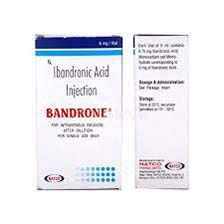Buy Bandrone Ibandronic Acid 6 mg Injection Online
$63.77
Brand Name : Bandrone
Composition : Ibandronic Acid
Manufactured by : Natco Pharma Ltd.
Strength : 6 mg
Form : Injection
Packing : Pack of 1 Vial
Prescription Required *
Bandrone is a brand name for the generic drug Ibandronic Acid. It belongs to a class of medications called bisphosphonates. It is used to treat or prevent bone loss in patients with osteoporosis or to treat high levels of calcium in the blood due to cancer. It works by reducing the breakdown of bone tissue, which helps to increase bone density and prevent bone fractures.
Uses:
Bandrone is primarily used to treat osteoporosis in postmenopausal women. It can also be used to prevent bone loss in patients with certain types of cancer, such as breast cancer and multiple myeloma. Bandrone works by slowing down the activity of osteoclasts, which are cells responsible for the breakdown of bone tissue.
HOW TO USE:
Bandrone is given as an injection into a vein generally at a hospital or medical facility by a healthcare professional. The injection is given once every 3 to 4 weeks, depending on the patient’s condition and response to treatment. It is important to follow the dosage and schedule recommended by your doctor and to not miss any appointments. Injections should only be given by a healthcare professional.
Storage Conditions:
Bandrone injections should be stored at room temperature and protected from light. They should be kept out of the reach of children and pets. Do not freeze this medication.
Mechanism of Action:
Bandrone works by reducing the activity of osteoclasts which are cells responsible for the breakdown of bone tissue. By reducing the activity of these cells, Bandrone helps to increase bone density and reduce the risk of fracture. In patients with cancer, the medication also helps to reduce the levels of calcium in the blood, which can be harmful when too high.
Precautions:
Before taking Bandrone, it is important to tell your doctor if you have any allergies or medical conditions. Patients with kidney disease, low calcium levels, or those who are pregnant or breastfeeding should inform their healthcare providers before taking Bandrone.
Contraindications:
Bandrone is contraindicated in patients who are allergic to Ibandronic Acid or bisphosphonates, or any of the ingredients in this medication. It is also contraindicated in patients with hypocalcemia (low calcium levels), and those who are pregnant or breastfeeding.
Drug Interactions:
Bandrone can interact with several other medications, including calcium supplements, antacids, and non-steroidal anti-inflammatory drugs (NSAIDs). Patients should tell their doctor about all the medications they are taking before starting Bandrone.
Overdose:
In case of an overdose of Bandrone, seek medical attention right away. Symptoms of an overdose may include nausea, vomiting, abdominal pain, and diarrhea.
Side Effects:
The most commonly reported side effects of Bandrone include flu-like symptoms, such as fever, chills, and muscle pain. Other side effects may include nausea, vomiting, diarrhea, and headache. Less common side effects may include kidney problems, osteonecrosis of the jaw, and atrial fibrillation. It is important to tell your doctor if you experience any side effects or symptoms while taking Bandrone.
Be the first to review “Buy Bandrone Ibandronic Acid 6 mg Injection Online” Cancel reply
Related products
Osteoporosis Arthritis
Osteoporosis Arthritis
Osteoporosis Arthritis
Osteoporosis Arthritis
Osteoporosis Arthritis
Osteoporosis Arthritis
Buy Prolia (denosumab) Injection 1 pre-filled syringe 60mg/ml Online For Sale
Osteoporosis Arthritis
Osteoporosis Arthritis













Reviews
There are no reviews yet.